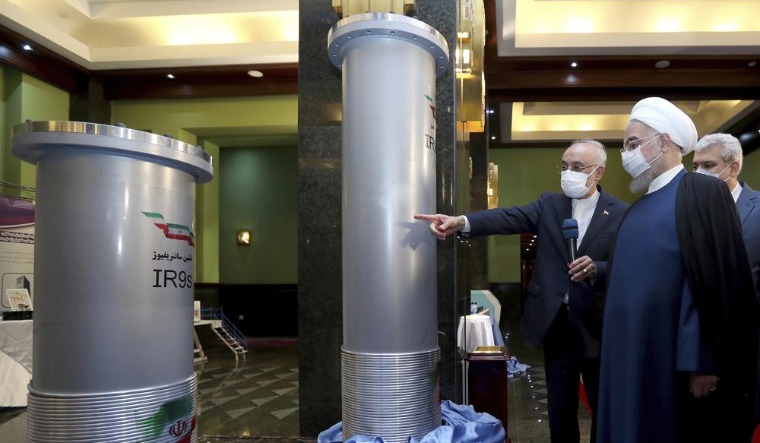Iranian state television on Friday offered an extended defence against an accusation attributed to international inspectors that it enriched uranium to 84 per cent purity, with an official calling it part of a conspiracy against Tehran amid tensions over its nuclear program.
The comments by Behrouz Kamalvandi, a spokesman for Iran's civilian nuclear programme, sought to portray any detection of uranium particles enriched to that level as a momentary side effect of trying to reach a finished product of 60 per cent purity, which Tehran already has announced producing.
However, uranium at 84 per cent is at nearly weapons-grade levels of 90 per cent meaning any stockpile of that material could be quickly used to produce an atomic bomb if Iran chooses. Tehran long has insisted its program is for peaceful purposes, though the International Atomic Energy Agency, Western intelligence agencies and nonproliferation experts say Iran pursued a secret nuclear weapons program up until 2003.
The allegation IAEA inspectors found 84 per cent enriched uranium threatens to further escalate tensions between Iran and the West. Already, Israel's recently reinstalled Prime Minister Benjamin Netanyahu has threatened military actions against Tehran.
Bloomberg first reported Sunday that inspectors had detected uranium particles enriched up to 84 per cent. The IAEA, a United Nations agency based in Vienna, has not denied the report, saying only that the IAEA is discussing with Iran the results of recent agency verification activities.
In an interview with Iranian state television's English-language arm, Press TV highlighted Friday, Kamalvandi dismissed what inspectors may have found as a particle of an atom that cannot be seen even under a microscope." He described Iran's uranium centrifuge cascades as producing particles at varying purity that later form a final product of 60 per cent.
It doesn't matter because the end product is what matters, Kamalvandi said. If we really want to enrich 20 per cent more, we will announce it very easily. So it is clear that there is a conspiracy here.
Iran's 2015 nuclear deal limited Tehran's uranium enrichment to 3.67 per cent enough to fuel a nuclear power plant. The US unilaterally withdrew from the accord in 2018. Since then, a shadow war between Israel and Iran has erupted across the wider Middle East.
also read
Iran now produces uranium enriched to 60 per cent purity a level at which nonproliferation experts already say Tehran has no civilian use. Any accusation of enrichment higher than that further ratchets up tension over the program, something Iran has appeared to acknowledge through a series of comments this week about the allegation attributed to the international inspectors.
While the IAEA's director-general has warned Iran now has enough uranium to produce several nuclear bombs if it chooses, it likely would take months more to build a weapon and potentially miniaturise it to put on a missile.
As recently as last March, the US intelligence community assessed Iran is not currently undertaking the key nuclear weapons-development activities that we judge would be necessary to produce a nuclear device.
Meanwhile late Thursday night, online videos showed explosions and anti-aircraft fire in Karaj, a city about 40 kilometers (25 miles) northwest of the Iranian capital, Tehran. Tracer rounds lit up the night sky, with the thud of blasts heard in the videos.
Iran's state-run IRNA news agency later attributed the activity to an unannounced drill at a base for the paramilitary Revolutionary Guard. In 2021, a suspected Israeli strike drone damaged a centrifuge assembly facility in Karaj.



